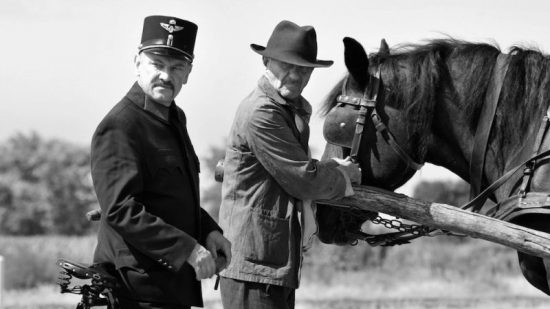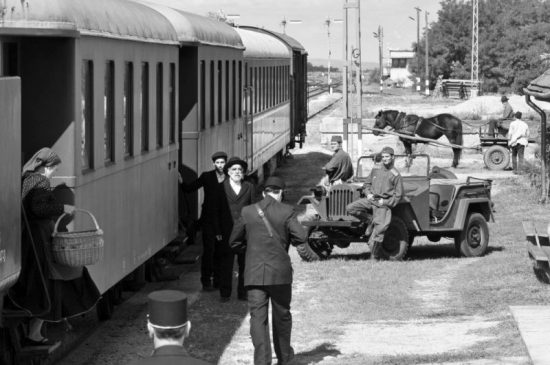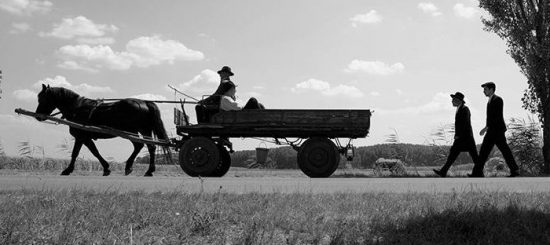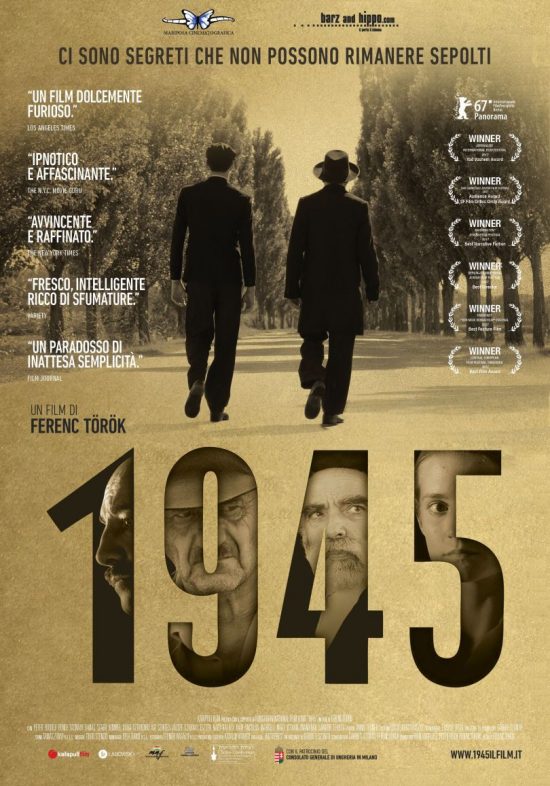Review: 1945 – “Simmers slowly through deep emotions of guilt, anger and grief”
Directed by Ferenc Török.
Starring Péter Rudolf, Bence Tasnádi, Tamás Szabó Kimmel, Dóra Sztarenki, Iván Angelus, Marcell Nagy.
If someone had told me that there existed a Hungarian film in black and white which draws heavily on the style of Sergio Leone’s Westerns to create a different angle on the Holocaust, I think I would have been scornful, and yet that’s essentially what Ferenc Török has done with this astonishing film.
In a railway station by a tiny Hungarian village, still transitioning from Nazi to Soviet occupation, the station master sweats in the summer heat, then sweats more from nerves as he observes two Orthodox Jewish men, a father and son (Iván Angelus and Marcell Nagy), disembarking the train, with two large chests which they have loaded onto a waiting horse and cart. As the pair walk slowly behind the cart towards the village, the station master cycles hurriedly ahead to warn the locals. What exactly do they have to fear from a middle-aged man and his son? It isn’t clear at first (although if you know your history you may well guess).
Péter Rudolf’s town clerk is especially worried by this arrival. A small, rotund, bald man who clearly enjoys having power and status in the village (and is worried about the changes the Soviet occupation may bring) and word soon spreads throughout the village about the imminent arrivals. Adding to this stew, this is the day of the clerk’s son’s wedding, and the entire village is involved – a chance for him to peacock his way around town and appear benevolent while really reinforcing his authority. And suddenly his little kingdom is falling apart as these two men approach, and his family and neighbours whisper about them, which family they are from, what they will demand when they arrive in town.
It’s soon apparent that most of the town fears the arrivals of these two Jewish men – as happened in many small towns across Europe the local Jews were rounded up by the Nazis, deported to the camps, and few lived to return. Meanwhile, some of their former friends and neighbours made out rather well, taking their belongings, businesses and homes (Spiegelman included a section on this in his masterpiece, Maus). Safe to say they did not anticipate any of their Hebrew neighbours returning from that deportation. Some feel renewed guilt over what they did, how they profited, others hide their guilt with anger – how dare they try to take back these homes!
One of the most remarkable aspects of 1945 is that the Jewish father and son whose arrival precipitates this tsunami of guilt and soul-searching do very little in this narrative – they are glimpsed time and again, slowly walking through the heat-haze of the summer day, behind the wagon with their long trunks on the back, like a slow, dignified funeral procession. Their approaching presence is sufficient drive as the camera moves around the village, shots seen through twitching net curtains, guilty glances exchanged in the heat, recriminations start to mount, past sins surface, “foul deed will rise”.
Török allows all of this to stir and simmer, the villagers creating their own downfalls from their own past sins, their own darkness eating their souls. His director of photography Elemér Ragályi can’t be praised highly enough for his work lensing 1945 – his lighting and camera work allows Török to let the camera linger over the faces of the villagers, much the way Leone does with many of his (often unusual looking) subjects, in long, slow close-ups, taking time to build it all up. The white-washed village buildings glow in the strong sunlight, like the Mexican towns of an old Western, the black and white creating delicious, sharp contrasts with the shadows indoors, or low angles across the stubble of freshly harvested fields, through the heat haze towards the approaching father and son walking slowly, oh so slowly, towards the village.
It’s gorgeous-looking cinematography, and the use of numerous Western tropes fits this narrative of sin and guilt remarkably well, the father and son seen from one angle resemble mourners walking behind a hearse, from another angle they look like avenging gunfighters coming into a wicked town for some violent redemption (you could almost imagine the pocket watch music from For a Few Dollars More playing over these scenes).
The film is littered with other symbols the viewer can interpret (is the smoke from the steam train just smoke, or a metaphor for the smoke that billowed from the chimneys of the death camps? The harvesting of the summer fields shorthand for the lives mown down? You’re free to interpret). 1945 is a stunning-looking piece of cinema that simmers slowly through deep emotions of guilt, anger and grief, and hints that the worst monster isn’t the spectre of eventual revenge for one’s sins but the poison those sins spill within our souls. I’m very glad my local Filmhouse picked this as one of their best 2018 films deserving re-screening.













